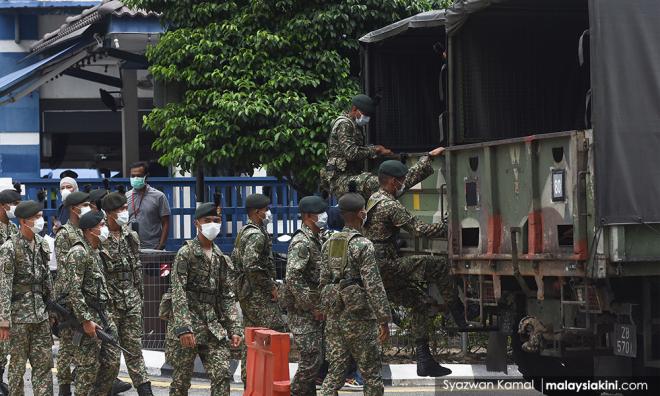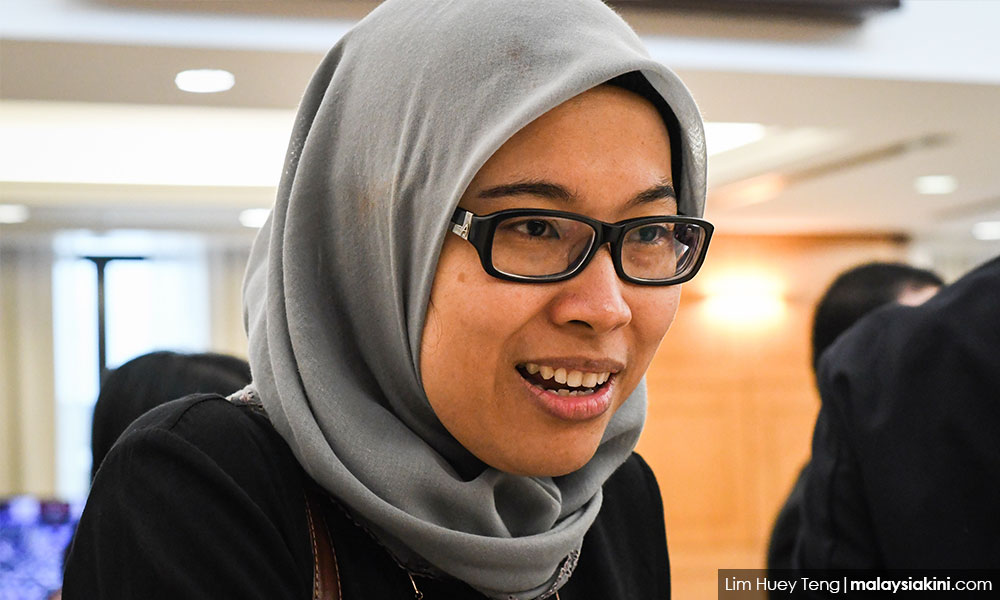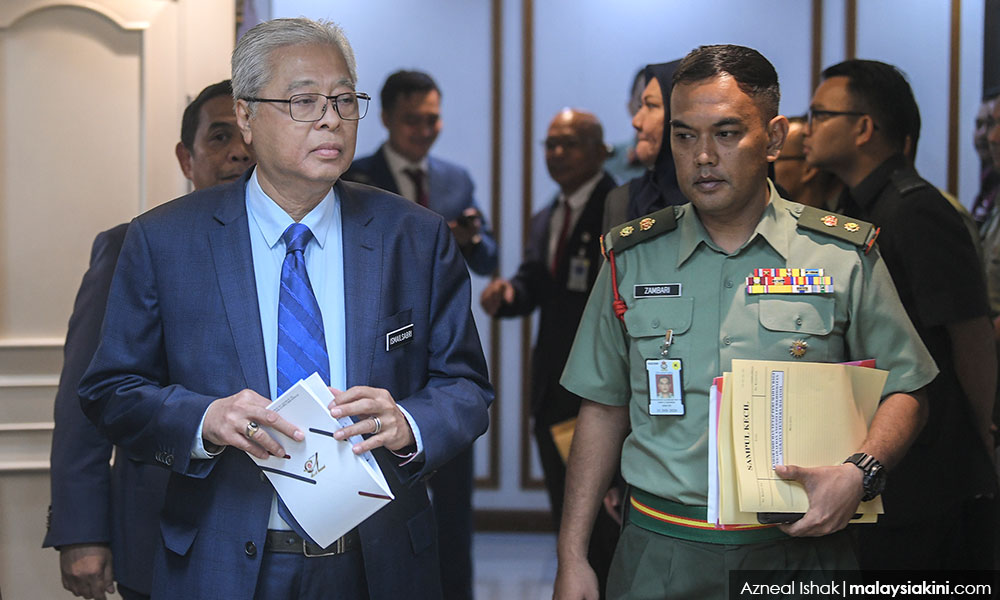State should not cavalierly normalise military presence

“Emergencies have always been used to expand authoritarian powers. Pay attention to history. We cannot afford to suspend critical thinking in these dangerous times.”
- Fadiah Nadwa Fikri
Before I begin, I would like to remind readers that I am one of those military types who are on record despising the propagandisation of the military. When I was serving the state, my primary concerns were the objectives of the mission and the welfare of the men under my command.
I have very little patience for “civilians” who fetishise patriotism and militarism as if the military operates in a vacuum without political or commercial interests or interference. To understand where I am coming from, read my article here.
Having received many texts, emails and phone calls about the government’s use of the army to assist the police in enforcing the movement control order (MCO), all I can say that this is a question of trust more than anything else. Let me be very clear. A certain segment of the polity does not trust this government. This segment is partisan in nature. They are not wrong to believe as they do.
The military establishment, when I was a part of it, was different then it is now. I have witnessed firsthand the kind of expansion of authoritarian rule – in neighbouring countries and here – which Fadiah alludes to in her Facebook post.
What this government has done, instead of bringing political camps together, is carrying out a partisan agenda, the most infamous of which was not including “opposition” states in a high-level meeting on the pandemic virus. Furthermore, the prime minister is, at this moment, in a protracted conflict with his own party. There have been sub rosa moves by the state to carry out agendas, which had nothing to with fighting the pandemic but rather to spread toxic religiosity.
The aborted suspension of the Talian Kasih hotline is a case in point. As reported in the press – “The 24-hour hotline was to have halted operations along with other non-essential government services during the restriction of movement order to contain the coronavirus disease from today until March 31. After taking into consideration the needs of the women, children, disabled, and the senior citizens, the government has agreed that the existing Talian Kasih, coordinated by the Ministry of Women, Family and Community development, will remain open as usual. “

It is in this environment of mistrust that activists like Fadiah (photo, above) are rightly worried that the state has a sinister motive. State players have been busy attempting to convince the rakyat that this is not a prelude to an emergency but the fact remains when you usurp the democratic process, you cast suspicion on your motives.
Patriot’s Mohamed Arshad Raji, who knows a thing or two about exigent circumstances, is right to call the decision to include the army “hasty”. Liew Chin Tong in his informative piece correctly argues that there is more the army could do than merely patrolling.
Furthermore, if you read the uses of the military in other democratic countries, they go far beyond “patrolling” and engage in the kind of primary and ancillary logistic and medical help that Liew, in his informative article, describes.
In this situation, who does the army report to? Are they under the authority of the police or do they report to someone else? Remember there are legal provisions to these types of strategies and the military has its code of conduct and operational doctrines. The army had to refute the news that its personnel would beat up any who refused to comply with the MCO. What are the parameters of the use of force?
What the state has done is to take advantage of the fact that some Malaysians are not taking this pandemic seriously. Police officers have related to me their amazement that many people are unconcerned about the pandemic and acting as if there is no MCO.
Truth be told. There is a need for stricter enforcement and the police and the various units affiliated with them, are more than capable of handling this crisis. State security personnel have been sending me photos and videos of the unconcerned citizens flocking restaurants and markets and acting as if everything was normal.
This, of course, has to change.
The fact that state governments are toughening the MCO and modifying the MCO to better suit their communities is a step in the right direction. This is also a fine example of one long-cherished conservative principle of “state rights” and perhaps a bright spot in this horrendous pandemic, because what this does is reinforces the idea that one size does not fit all and individual communities have to resort to measures which best suit them in combating this pandemic.
Police personnel have sent me videos and pictures of the army carrying out their “duties” and the main question they keep asking is, why do politicians need the army to do this? They tell me, that they have the capabilities of crowd control and dispersion and are more than capable of handling this situation.
Yes, there should be a show of force and the branch of the government which should be doing this is the PDRM and their affiliated trained units.

Defence Minister Ismail Sabri (photo) said something rather queer. He said: "The army will be mobilised this Sunday and we are confident that with the army's help, stricter enforcement can be carried out." This is a rather ominous statement because the army is put in a position as “enforcer” as in “stricter” enforcement, which does nothing to mitigate the anxiety of an already frazzled rakyat. This is not or should not be the use of the military and displays ignorance on the various instruments of a supposedly democratic state in ensuring compliance from a diverse - religious and racial - polity.
The use of the army in this situation seems more symbolic than anything else. The state wants to project a forceful presence and they believe the presence of the army does this. While police personnel patrolling the streets and dispersing crowds is something within the bounds of normalcy, a military presence implies something else.
The fact is that the PDRM and its units have handled anti-government rallies, anti-government crackdowns, anti-terrorist takedowns, immigration raids, religious raids, drug raids and a host of other urban and rural operations which make them ideally suited for the task.
The police have received criticisms for the way they have handled these situations (including from this writer), which merely means that they can project a show of force and ensure compliance when needed. In this situation, ensuring compliance from a public slowly realising the gravity of the situation would be manageable for the PDRM and not something that the army should be involved with.
Is anyone seriously making the argument that the PDRM cannot handle the MCO and Perikatan Nasional needs the army, which as Liew correctly points out, would have utilitarian value in other aspects of this pandemic?
The last thing the state should do is normalise the presence of the army in civilian centres.
S THAYAPARAN is Commander (Rtd) of the Royal Malaysian Navy. A retired barrister-at-law, he is one of the founding members of Persatuan Patriot Kebangsaan. - Mkini
✍ Credit given to the original owner of this post : ☕ Malaysians Must Know the TRUTH
🌐 Hit This Link To Find Out More On Their Articles...🏄🏻♀️ Enjoy Surfing!



















Post a Comment